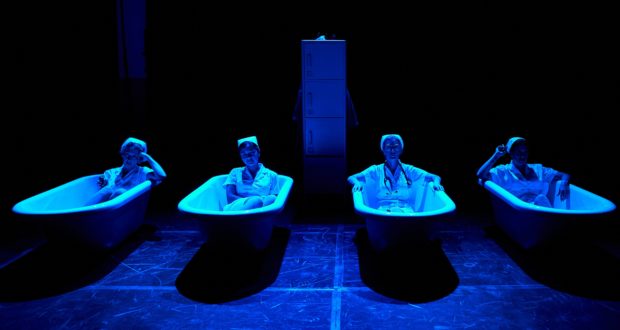A disturbing real story of extermination is translated into a play where the dramaturgy is weak and the succession of events feel disjointed. Summary
Rating
Good
In 1991 four Austrian nurses, played by Evelyn Edwards, Andrea Helene, Aurora Henning and author Jessica Ross, were charged with the killing of 49 patients between 1983 and 1989. Although this was the number of those ascertained, it is believed that the real count might have been over 200. Their technique was simple; one nurse would restrain the patient and pinch their nose, whilst the other would pour water into their mouth until they drowned. With most of the patients being elderly, the presence of liquid in their lungs was never considered suspicious, until the day someone overheard one of their macabre conversations.
Instigating this killing spree was a supervising nurse, who considered it as an act of mercy towards those who were suffering. With time, however, the four angels of death extended their radius of action from those who were terminally ill to those who’d be deemed annoying or too needy. Murder became a pleasurable activity, a senseless outlet for childhood traumas, egoistic personalities, insecurity and domestic abuse.
The actual case investigation is still sealed, precluding the possibility to research it into more detail. Thus, the playwright preserved the original names but developed the four characters with inspirations from other famous killers. The outcome is a disjointed collection of episodes that fail to deliver the thrill aimed for. The compartmentalised structure of the plot alternates gruesome scenes of murder with upbeat 1980s musical intersections, which doesn’t allow the tension to build properly. A curious choice for a work that describes itself as “blistering” whilst generating comic effect with songs like Queen’s “Another One Bites the Dust”.
The personal motives that pushed the four women to become murderesses are told directly to the audience, like in a confessional, rather than incorporated within the events. This lack of dramaturgy extends also to the closing scene, which is narrated by an external voice rather than acted.
Beyond these weaknesses, the piece is supported by an elaborate set and an intense use of lighting. The opening scene in particular, with the four bathtubs aligned across the stage and the nurses sitting inside them under a deep blue lighting is arresting. This is a work that hasn’t decided yet whether to be drama or comedy. As a result, it suffers in both fields.
Author: Jessica Ross
Director: Steven Roy
Producer: Dark Lady Co
Box Office: +44 (0)131 226 0000
Booking Link: https://tickets.edfringe.com/whats-on/drowning
Booking Until: 26 August 2019
 Everything Theatre Reviews, interviews and news for theatre lovers, London and beyond
Everything Theatre Reviews, interviews and news for theatre lovers, London and beyond



